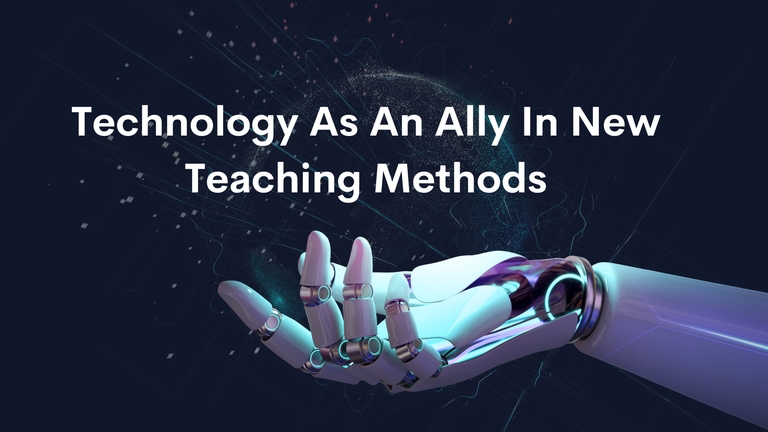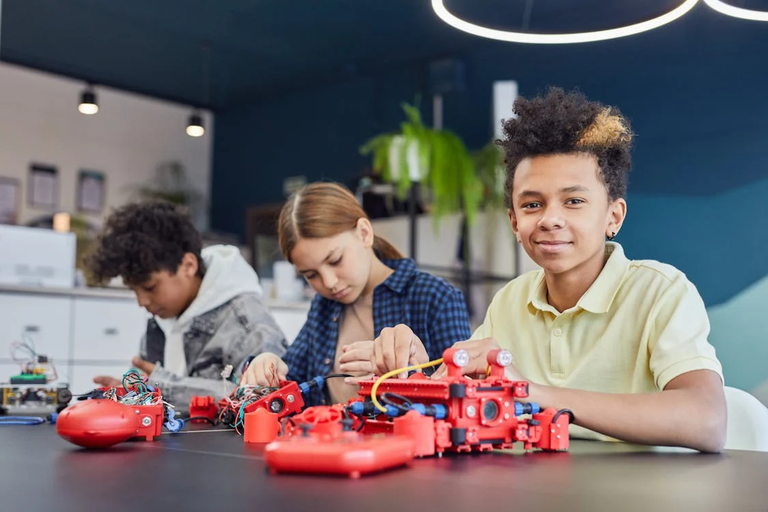[EN/PT] Technology As An Ally In New Teaching Methods
[EN]

I am a lifelong learner, and back in my elementary school days, the main method used to assess the knowledge acquired in a subject was through written exams. The problem was that most students only studied to memorize the material, and right after the exam, the brain discarded most of what had been learned.
Time has passed, but many schools still adopt this age-old model as the main form of assessment. However, the world has drastically changed in terms of technologies and innovations. Performing poorly on an exam doesn’t necessarily mean that the student hasn’t learned something. Evaluating knowledge through written tests has never been the best way to measure learning—especially nowadays.
Information changes and evolves quickly. So why would someone need to store so much information in their head when it’s constantly changing? Of course, there are fundamental concepts that serve as a foundation and need to be firmly embedded in students’ minds, but a lot of information can be accessed in other ways.
With the advent of Artificial Intelligence, many people, including young individuals, use these tools to help with various tasks. This leads me to believe that it is of utmost importance to introduce flexibility into the archaic methods of teaching.
The value of learning today no longer lies in accumulating facts but in understanding, applying, and synthesizing information to solve complex problems. Allowing students to use the internet or other technologies during exams could be beneficial, provided that the focus of the evaluation shifts from “testing what they remember” to “evaluating what they can do with the information.”
The world has changed dramatically. In the past, children and young people dedicated themselves to studying daily. Today, many young people no longer have the same patience, spending a significant amount of time on screens—cell phones, computers, and video games. But who said this is entirely negative? Everything has its good and bad sides. Many young people from this generation are extremely intelligent, spending hours on the internet or playing video games, developing skills that would be difficult to acquire through traditional methods of study.
I have a 12-year-old brother-in-law who learned English just by playing games and watching videos. He’s not at an advanced level, but he can already understand, write, and even speak basic English. If he hadn’t had contact with these new technologies, he might not have developed this skill as easily.
He is extremely intelligent and retains information simply by paying attention to what is being taught, without needing to study intensively for exams. Of course, there are subjects in which he struggles more, and in those, he needs to put in more effort.
For young people who have an easier time learning, it would be highly valuable to change the way they are assessed. For example, instead of requiring the memorization of content, exams could be based on real-world, long-term problems, where students would use their research, critical thinking, and creativity skills to find solutions.
Another effective methodology would be to integrate technology into academic learning, as in the professional world, many careers rely heavily on technology. One example is schools that use robotics to teach mathematics, physics, music, and programming languages.

The world has changed, and the way we teach our young people needs to keep up with these changes. Of course, this is complicated in some realities, as there aren't always enough resources to implement these ideas. What's more, not all young people are able to use these tools productively. Many, unfortunately, end up using the internet and cell phones in a way that slows down their mental development.
That's why I think it's difficult to completely replace the traditional method of teaching and assessment. However, I am in favor of changes, even if they are implemented gradually and over the long term, so that the impacts are positive and don't cause major problems.
If you've made it this far, thank you very much for your time and if in any way this content has been useful, please leave your upvote and reblog!

[PT]

Sou um eterno estudante, e na minha época de escola primária, o modelo de ensino para avaliar o conhecimento adquirido de uma disciplina era principalmente através de provas escritas. O problema é que a maioria dos alunos estudava apenas para decorar o conteúdo e, logo após a prova, o cérebro descartava a maior parte do que foi aprendido.
O tempo passou, mas muitas escolas ainda adotam esse modelo secular como principal forma de avaliação. No entanto, o mundo mudou drasticamente em termos de tecnologias e inovações. Um desempenho ruim em uma prova não significa, necessariamente, que o aluno não aprendeu. Avaliar o conhecimento por meio de testes escritos nunca foi a melhor maneira de medir o aprendizado – especialmente hoje.
A informação muda e evolui rapidamente. Por que uma pessoa precisaria armazenar tanta informação, se ela está em constante mudança? Claro, há conhecimentos fundamentais que funcionam como alicerces e precisam estar solidamente presentes na mente dos alunos, mas muitas informações podem ser acessadas de outras maneiras.
Com o advento da Inteligência Artificial, muitas pessoas, inclusive jovens, utilizam essas ferramentas para ajudar no desenvolvimento de diversas tarefas. Isso me leva a acreditar que flexibilizar os métodos arcaicos de ensino seria de extrema importância.
O valor do aprendizado hoje não está mais em acumular fatos, mas em entender, aplicar e sintetizar informações para resolver problemas complexos. Permitir que alunos usem a internet ou outras tecnologias durante os exames pode ser algo positivo, desde que o foco da avaliação mude de "testar o que eles lembram" para "avaliar o que eles sabem fazer com a informação."
O mundo mudou drasticamente. Antes, as crianças e jovens se dedicavam a estudar diariamente. Hoje, muitos jovens não têm mais a mesma paciência, e passam grande parte do tempo nas telas de celulares, computadores e videogames. Mas quem disse que isso é completamente negativo? Tudo tem seu lado bom e ruim. Muitos jovens dessa geração são extremamente inteligentes e passam horas na internet ou jogando videogames, desenvolvendo habilidades que dificilmente seriam adquiridas através de métodos tradicionais de ensino.
Tenho um cunhado de 12 anos que aprendeu inglês jogando e assistindo vídeos. Ele não tem um nível avançado, mas já consegue entender, escrever e até falar o básico. Se ele não tivesse tido contato com essas novas tecnologias, talvez não tivesse desenvolvido essa habilidade com tanta facilidade.
Ele é extremamente inteligente e retém informações apenas prestando atenção no que é ensinado, sem precisar estudar intensivamente para as provas. Claro, há disciplinas em que ele tem mais dificuldade, e nessas ele precisa se esforçar mais.
Para jovens que possuem facilidade de aprendizado, seria muito valioso mudar a forma de avaliá-los. Por exemplo, em vez de exigir a memorização de conteúdo, os exames poderiam ser baseados em problemas reais e de longo prazo, onde os alunos utilizariam suas habilidades de pesquisa, pensamento crítico e criatividade para encontrar soluções.
Outra metodologia eficaz seria integrar a tecnologia ao ensino acadêmico, já que na vida profissional muitas profissões fazem uso constante da tecnologia. Um exemplo são as escolas que utilizam robótica para ensinar matemática, física, música e linguagem de programação.

O mundo mudou, e o jeito como ensinamos nossos jovens precisa acompanhar essas mudanças. Claro, isso é complicado em algumas realidades, pois nem sempre há recursos suficientes para implementar essas ideias. Além disso, nem todos os jovens conseguem usar essas ferramentas de forma produtiva. Muitos, infelizmente, acabam utilizando a internet e celulares de maneira que atrasa seu desenvolvimento mental.
Por isso, acho que é complicado substituir completamente o método tradicional de ensino e avaliação. No entanto, sou a favor de mudanças, mesmo que implementadas de forma gradual e a longo prazo, para que os impactos sejam positivos e não causem grandes problemas.
Se chegou até aqui muito obrigado pelo seu tempo e se de alguma forma este conteudo foi útil, deixe seu upvote e reblog!


Obrigado por promover a comunidade Hive-BR em suas postagens.
Vamos seguir fortalecendo a Hive
Congratulations @elderdark! You have completed the following achievement on the Hive blockchain And have been rewarded with New badge(s)
Your next target is to reach 6000 replies.
You can view your badges on your board and compare yourself to others in the Ranking
If you no longer want to receive notifications, reply to this comment with the word
STOPCheck out our last posts:
AI pode ser usado para o bem e para o mal rs ! Para o bem vejo produtivo conversas com AI para aprender assuntos!
!hiqvote
IA é uma ferramenta muito legal para ser usada como ferramenta de aprendizado. O problema é quando são usadas de maneira errada, como querer resolver coisas complexas sem ao menos pensar no que está se fazendo
Your post was manually curated by @vempromundo.
Delegate your HP to the hive-br.voter account and earn Hive daily!
🔹 Follow our Curation Trail and don't miss voting! 🔹
With the help of artificial intelligence, students can now overcome difficult task within the twinkle of an eye.
I agree, the problem is that they use AI, but they don't make the effort to find out how that result was obtained.
Acho que todos somos dessa época, já que a escola é uma entidade que se transforma lentamente. E se for olhar hoje, pouco deve ter mudado, o que é bem curioso tendo em vista os avanços da tecnologia em um curto período de tempo!
!BBH
A maioria do pessoal que está na Hive acho que é dessa época, onde não tinhamos celular e internet para fazer consultas e ajudar a resolver problemas escolares. Infelizmente, a educação não tem acompanhado as mudanças tecnologicas
@elderdark! @crazyphantombr likes your content! so I just sent 1 BBH to your account on behalf of @crazyphantombr. (1/5)
(html comment removed: )
)
Conseguir aplicar na pratica as provas seria algo muito mais vantajoso, acredito que é melhor para todos, pois como você mencionou muitos de nós apenas decora respostas para as provas e depois disso? Só quem tem realmente vontade de aprender para deixar na memoria, com a aplicação mais pratica tenho certeza que entraria mais na cabeça de cada pessoa tudo o que aprendeu.
Rapaz eu lembro que estudava as coisas decorando e depois de duas semanas, mesmo precisando do assunto estudado não lembrava mais de quase nada.
kkkkkkkk ja fui assim também, ai vc tinha que estudar tudo de novo para lembrar de novo de tudo o que estudou la atrás kkk